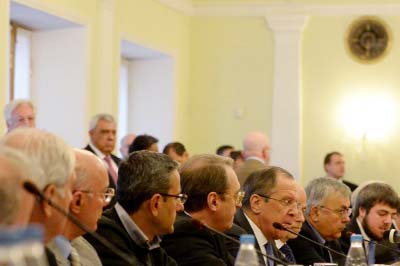
AFP, Moscow :
Syrian representatives of President Bashar al-Assad’s regime and opposition figures ended a two-day round of talks in Moscow on Thursday without concrete result, except an agreement to meet again.
Syria’s UN representative and head of the government delegation in Moscow, Bashar al-Jaafari, told reporters: “We agreed with our Russian friends that discussions will continue in order to hold a (new) consultative meeting in future.”
Jaafari said the Syrian government delegation was “positive” about the talks, though there were “no final results because it was an initial, consultative meeting”.
He blamed the opposition figures who attended the talks for the failure to make a breakthrough.
“We did not hear a single unified position from the opposition delegations. What some could agree on, others rejected,” said Jaafari.
The government has agreed to a set of points titled the “Moscow principles”, said Jaafari, adding that while some of the opponents present also agreed to the points, others rejected them outright.
“We, the government, aim to hold a dialogue conference in Damascus,” said Jaafari, adding that such a meeting “would be the last of a series of… meetings.”
Meanwhile, Soheir Sarmini, a regime-tolerated opponent, said: “The goal of the Moscow meeting was to break the ice between the government and the opposition.”
Russia is the main backer of Assad’s regime.
Two previous rounds of talks in Geneva also ended without success.
The main exiled opposition alliance, the National Coalition, did not attend the talks, though five of its members were there in a personal capacity, along with members of opposition groups tolerated by the Damascus authorities.
Baghdad report adds: The Iraqi government vowed today to investigate accusations backed by eyewitness accounts that Shiite militias massacred more than 70 Sunni villagers during an operation against jihadists in Diyala province.
Survivors and Sunni officials say the massacre took place on Monday in Barwana as soldiers and allied militias wrapped up an operation to expel Islamic State (IS) jihadists from their last urban bastion in Diyala.
Some military officials have already denied the allegations but Prime Minister Haider al-Abadi announced that an inquiry has been opened.
“The prime minister has ordered an investigation into the matter,” his spokesman Rafid Jaboori told AFP, without elaborating.
Barwana is a small village located just west of the town of Muqdadiyah. It housed several Sunni families who had fled IS rule over neighbouring villages.
Shiite militiamen entered Barwana on Monday and allegedly selected young men after checking their IDs before lining them up to be shot.
“Cars filled with men carrying mostly light weapons entered the village. They gathered all the people in one place, including some children,” said Nahda al-Daini, a lawmaker from Diyala.
“They executed 77 of them,” she told AFP. “It was Shiite militia forces who carried out this massacre with cover from the security forces.”
Ali Juburi, a 27-year-old father of one, fled to Barwana from nearby Hamada village in June, when IS jihadists swept through swathes of Iraq.
Syrian representatives of President Bashar al-Assad’s regime and opposition figures ended a two-day round of talks in Moscow on Thursday without concrete result, except an agreement to meet again.
Syria’s UN representative and head of the government delegation in Moscow, Bashar al-Jaafari, told reporters: “We agreed with our Russian friends that discussions will continue in order to hold a (new) consultative meeting in future.”
Jaafari said the Syrian government delegation was “positive” about the talks, though there were “no final results because it was an initial, consultative meeting”.
He blamed the opposition figures who attended the talks for the failure to make a breakthrough.
“We did not hear a single unified position from the opposition delegations. What some could agree on, others rejected,” said Jaafari.
The government has agreed to a set of points titled the “Moscow principles”, said Jaafari, adding that while some of the opponents present also agreed to the points, others rejected them outright.
“We, the government, aim to hold a dialogue conference in Damascus,” said Jaafari, adding that such a meeting “would be the last of a series of… meetings.”
Meanwhile, Soheir Sarmini, a regime-tolerated opponent, said: “The goal of the Moscow meeting was to break the ice between the government and the opposition.”
Russia is the main backer of Assad’s regime.
Two previous rounds of talks in Geneva also ended without success.
The main exiled opposition alliance, the National Coalition, did not attend the talks, though five of its members were there in a personal capacity, along with members of opposition groups tolerated by the Damascus authorities.
Baghdad report adds: The Iraqi government vowed today to investigate accusations backed by eyewitness accounts that Shiite militias massacred more than 70 Sunni villagers during an operation against jihadists in Diyala province.
Survivors and Sunni officials say the massacre took place on Monday in Barwana as soldiers and allied militias wrapped up an operation to expel Islamic State (IS) jihadists from their last urban bastion in Diyala.
Some military officials have already denied the allegations but Prime Minister Haider al-Abadi announced that an inquiry has been opened.
“The prime minister has ordered an investigation into the matter,” his spokesman Rafid Jaboori told AFP, without elaborating.
Barwana is a small village located just west of the town of Muqdadiyah. It housed several Sunni families who had fled IS rule over neighbouring villages.
Shiite militiamen entered Barwana on Monday and allegedly selected young men after checking their IDs before lining them up to be shot.
“Cars filled with men carrying mostly light weapons entered the village. They gathered all the people in one place, including some children,” said Nahda al-Daini, a lawmaker from Diyala.
“They executed 77 of them,” she told AFP. “It was Shiite militia forces who carried out this massacre with cover from the security forces.”
Ali Juburi, a 27-year-old father of one, fled to Barwana from nearby Hamada village in June, when IS jihadists swept through swathes of Iraq.

